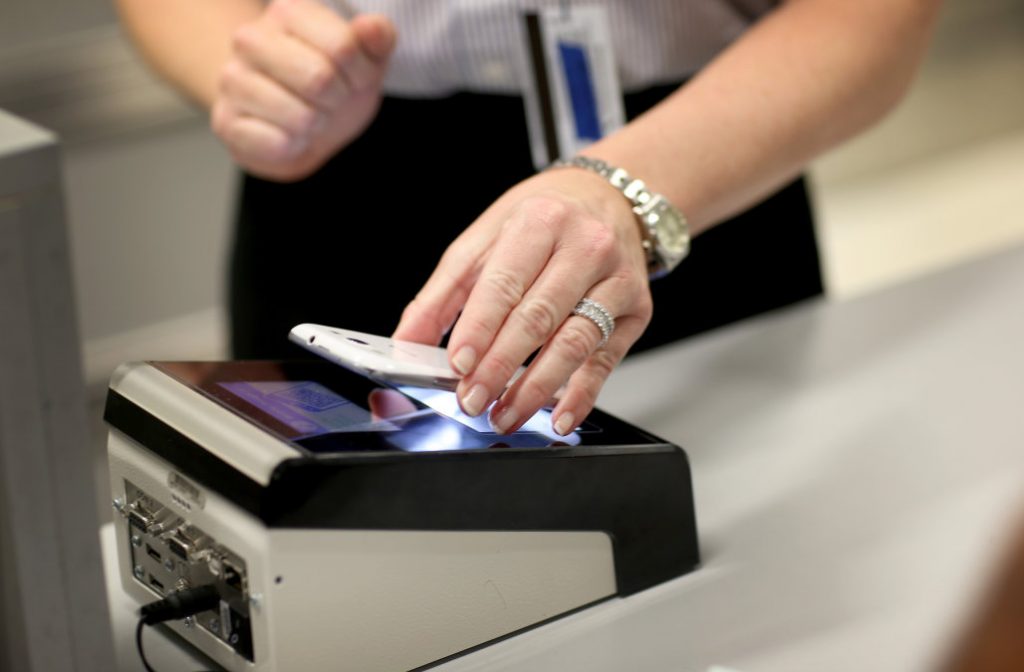Border Inspection of Electronic Devices

Image from AOL/ NBC News
By Reuben S. Seguritan
April 26, 2017
The inspection of electronic devices, including cell phones, by Customs and Border Protection (CBP) agents at the airports and at other ports of entry has been widely publicized. CBP agents have asked travelers to open their social media accounts and e-mails on their phone and also asked for the passwords to their cell phones. In some cases, the CBP has detained some electronic devices for further inspection because of the refusal of the traveler to cooperate. This has led to a lot of confusion and outrage among travelers to and from the United States as to whether the CBP has the authority to examine and detain cell phones and other electronic devices.
Unfortunately for travelers, the CBP does have the authority to search cell phones and other electronic devices at the border as part of their mandate. The CBP is required by law to determine the identity and citizenship of all persons seeking entry into the US; determine the admissibility of foreign nationals; deter the entry of possible terrorists, terrorist weapons, controlled substances; and a wide variety of other prohibited and restricted items.
The CBP has declared in their website that a traveler may be the subject of an inspection if: the travel documents presented are incomplete; the proper visa is lacking; the required documents are missing; the traveler has previously violated one of the laws CBP enforces; the name of the traveler matches a person of interest in one of the government’s enforcement databases; or the traveler was selected for a random search.
The CBP also stated in its website that if an electronic device is detained for further examination, its contents may be copied. In a separate statement, the Department of Homeland Security says it will destroy the copy if the data is not “necessary for law enforcement purposes.” The CBP has proudly announced that their search on electronic devices at the border has led to evidence that proved helpful in fighting terrorism, visa fraud, child pornography, intellectual property rights violations, and violations of export controls.
In official documents, the CBP and their agents has inspected the electronic devices of 14,993 international travelers for the first 6 months of fiscal year 2017 out of the 189.6 million travelers to the United States. In contrast, the electronic devices of 8,503 travelers were inspected in 2015, amounting to 0.002 percent of the 383.2 million arrivals. In fiscal year 2016, the number of travelers whose devices were searched rose to 19,033 which are about 0.005 percent of the 390.6 million arrivals.
If a traveler is concerned about his personal information and social media accounts, then he should not travel with any of his devices, especially his cell phone. The traveler could buy a cheap phone once he is admitted to the United States. If a traveler cannot leave his cell phone or laptop behind, then he should make sure that his data is encrypted and all social media applications are deleted from the phone. If a traveler decides to give the passwords, the CBP can look at everything and even copy the information and pictures therein.
The CBP cannot prevent a US citizen from returning to the United States if he refuses to comply with the request to provide his password and/or cell phone for inspection. However, travelers who don’t unlock their phones could be questioned, detained temporarily and have their phones taken by agents for further inspection anyway. If the traveler is not a US citizen, entry to the United States can be denied.
Lawyers, medical professionals, and journalists can say they have privileged and confidential files in their electronic devices. However, there is no guarantee that the CBP agents will recognize these as exceptions and not inspect the electronic devices anymore. The CBP has recognized that lawyers have attorney-client privilege and that CBP agents have to get approval before proceeding with the search. But the CBP does not lose its authority to search the phone or other electronic device.
